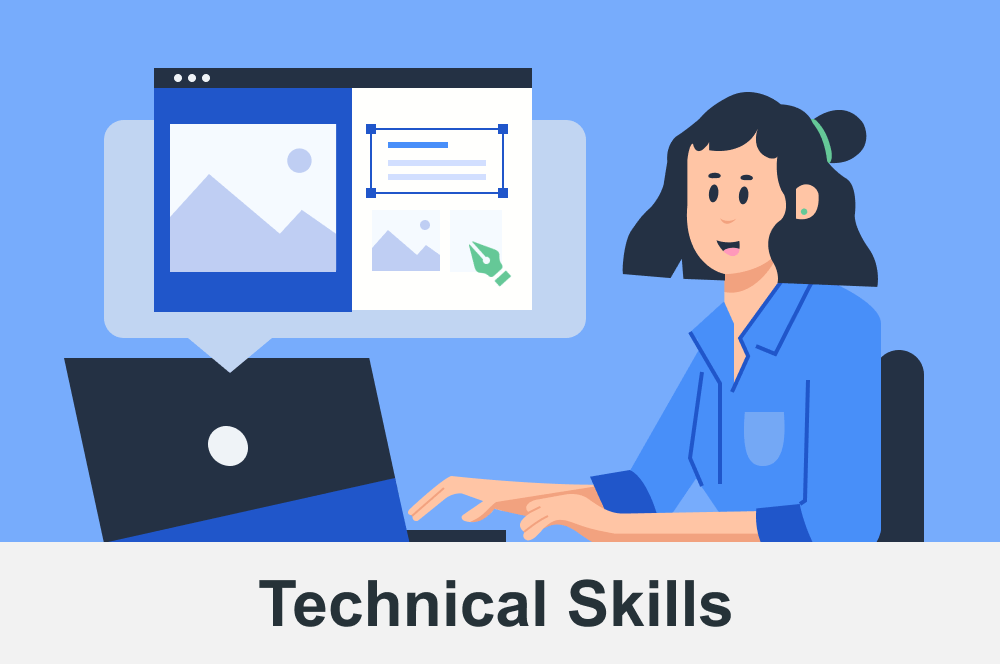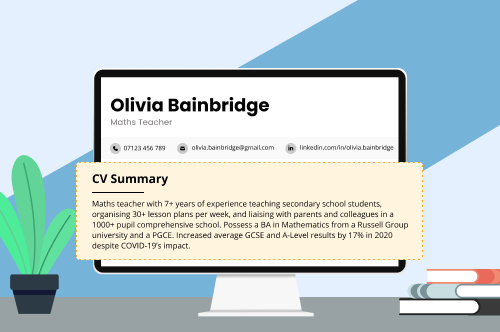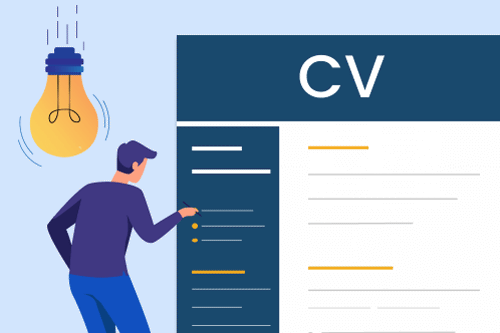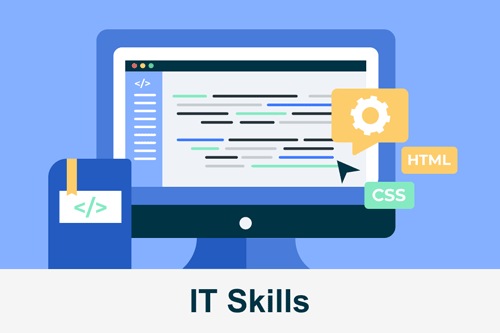Technical skills are the abilities and expertise needed to complete a specific task. Also known as hard skills, technical skills require training and practical experience to master and are often needed in science, technology, engineering, and mathematics (STEM) fields — as this video explains:
Examples of technical skills UK employers value most in 2024 include:
- artificial intelligence (AI)
- search engine optimisation (SEO)
- computer assisted design (CAD)
- technical writing
- cybersecurity
- software troubleshooting
- education techniques
- research skills
- cloud computing
- web development
Giving examples of technical skills on your CV is essential for showing employers you can handle complex tasks and processes in the workplace.
Skills you can’t learn from schooling or on-the-job experience are called soft skills. These non-technical skills are related to your personality and how you interact with others.
Below, we discuss the most relevant technical strengths for your CV and offer examples of how to put them on your CV to get employers interested in hiring you:
117+ technical skills examples employers look for on your CV
We’ve collected 117+ top technical skills from various industries, putting them into these eight categories:
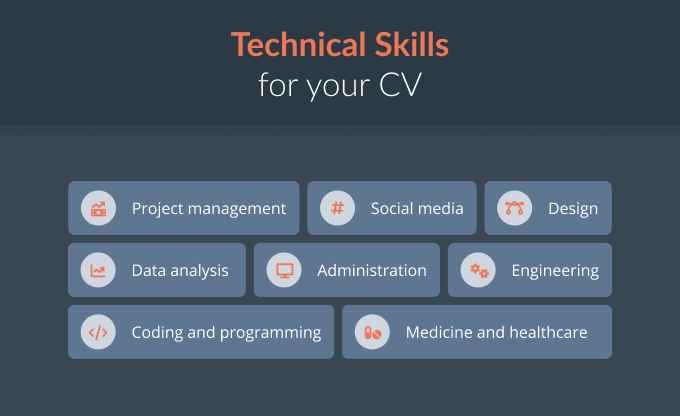
- Data analysis
- Design
- Project management
- Coding and programming
- Engineering
- Social media
- Administration
- Medicine and healthcare
1. Data analysis
Knowing how to collect, analyse, and interpret data is a valuable skill if you’re applying for technical positions in data analysis, finance, or management.
Companies and businesses make major decisions based on data and current trends, so highlighting your technical skills in this field increases your chances of getting an interview.
Employers value these data-related skills:
- Statistical analysis
- Data mining
- Algorithms
- Quantitative research
- Data modelling
- Machine learning
- Data visualisation
- MATLAB
- Amazon Web Services
- SQL
- Microsoft Excel
- Google BigQuery
- Cloudera
- Commvault
Here’s an example of a well-written CV work experience entry that showcases data analytics ability:
2. Design
Designers pick up industry-specific skills by receiving training and gaining practical experience in the field.
Whether you’re a seasoned professional or a budding designer, mention these essential skills on your CV to show you’d be a valuable asset to a company:
- Adobe Creative Cloud (e.g., Photoshop, Illustrator, InDesign)
- Figma
- Colour theory
- Interactive media
- User modelling
- UI/UX
- Responsive design
- Design principles
- Typography
- AI art tools (like OpenAI’s DALL·E)
If you’re unsure how to explain your design skills to employers, here’s a good example from a CV personal statement to follow:
Dynamic UI/UX designer with 5+ years’ experience in creating user-centred designs for mobile and web applications. Strong track record of enhancing user satisfaction and engagement through intuitive interfaces and user-friendly workflows. Highly skilled in leveraging user research, wireframing, and the latest design software to deliver aesthetically pleasing and functional products that meet business goals and user needs.
3. Project management
Companies hire project managers to lead their teams by managing project timeframes, delegating tasks, and measuring each project’s success. So list the technical skills that show you can perform those duties on your CV for a project manager role, such as:
- Risk management
- Scrum and Agile proficiency
- Project management tools (e.g., Trello, Basecamp, Zoho Projects, Microsoft Sharepoint, Hive, Asana)
- Contract management and procurement
- Monitoring and evaluating performance metrics
- Scheduling, budgeting, and cost control
This is a CV work experience bullet that does a great job of emphasising technical project management skills:
4. Coding and programming
Tech industry employers look for applicants who understand multiple programming languages and use them to create impressive digital tools and products.
If writing isn’t your strong suit, use an online CV maker that uses AI to write and format your content for you.
Here are several information technology–related skills for your CV:
- HTML
- CSS
- Java
- JavaScript
- PHP
- C#
- C++
- Go
- Python
- Ruby
- MongoDB
- React
- Vue
- Angular
- Node.js
- TypeScript
- Front-end development
- Back-end development
- Full stack development
- Web architecture
- Database storage
- Git and Github
- HTTP
- REST
- Network architecture
- AI-assisted coding
This personal statement from a computer programmer’s CV does an excellent job of showcasing the applicant’s technical skills:
Fast-working Computer Programmer with extensive experience in developing robust code for high-volume businesses. Combine Python, Java, and C# with a strong foundation in algorithms, data structures, and software engineering principles to innovate and solve complex problems, leading to significant improvements in system efficiency and productivity. Eager to optimise [Company Name]’s code as a Lead Programmer.
5. Engineering
Potential work projects for engineers include physical tasks ranging from constructing buildings or vehicles to brainstorming new concepts for software products.
So use these engineering technical skills to draw employers’ attention to your CV:
- CAD software
- Computer hardware skills
- Cloud collaboration (e.g., GoToMeeting, Dropbox)
- Programming languages
- Technical documentation
- Systems design and analysis
Here’s how one engineer effectively described their technical skills on their CV:
6. Social media
With 84.4% of the UK population using social media in 2023, maintaining a digital presence has become the norm. And if you work in marketing or tech, understanding how to use social media is important for boosting sales and growing your business.
Employers prefer applicants who stay up-to-date with modern technology, so ensure you list these social media skills on your CV:
- Job-relevant social media platforms: (e.g., Facebook, Instagram, TikTok, Pinterest, Twitter, LinkedIn)
- Copywriting (including AI writing with tools like ChatGPT)
- Search engine optimisation (SEO)
- Email marketing
- YouTube advertising
- Web analytics
- Cross-posting strategies
- Content management systems (CMS)
Even if you’re still a student, you can demonstrate job-relevant social media skills on your CV, like so:
Undergraduate student working towards a BA in Marketing with 3 years’ experience growing social media accounts for my family’s pickle business. Well-versed in engaging with users on Instagram and X, growing fan base from 0 to 50K+ and running successful advert campaigns that increased revenue by 15% on average. Ready to apply this experience on a larger scale as a Social Media Intern at Mondelez.
7. Administration
Administration skills involve effectively using basic office equipment and computer software to organise your work.
Here are examples of administrative skills to emphasise on your CV:
- Microsoft Office Suite
- Google Drive
- Email (Outlook, Gmail)
- Windows or Mac operating systems
- Productivity software (Evernote, Engross)
- Communication tools (Slack)
- Presentation software (Prezi)
- Inventory tracking
- Operating office equipment (e.g., presentation devices, shredders, printers)
- Typing skills
- Data entry
- Organising and filing records
- Scheduling appointments and maintaining calendars
- Writing and transcribing memos
- Conference calling software (Zoom, Skype, Webex)
- Accounting software
This is an example of how you should describe your administrative skills on your CV:
8. Medicine and healthcare
Healthcare specialisations include emergency medicine, dermatology, paediatrics, surgery, and ophthalmology — each of which requires a specialised set of technical skills.
Highlight medical abilities like these on your CV to prove you’re a qualified healthcare specialist:
- Adult life support training (ALS)
- Wound management
- Administering treatments
- Interpreting laboratory results
- Assessing symptoms
- Diagnosing conditions
- Performing surgical procedures
This personal statement is a good example of how to mention your healthcare-related technical skills on your CV:
Dedicated registered nurse, proficient in employing venipuncture, ECG interpretation, and ventilators, to provide exemplary patient care. Expertise in managing IV drips, administering medication through advanced infusion pumps, and using electronic health records (EHR) for accurate patient data management. Looking forward to enhancing healthcare outcomes and supporting your team in delivering high-quality care at Charing Cross Hospital.
Technical skills on a CV example
Here’s a full CV example that shows you how to put your technical skills together into one job-winning document:
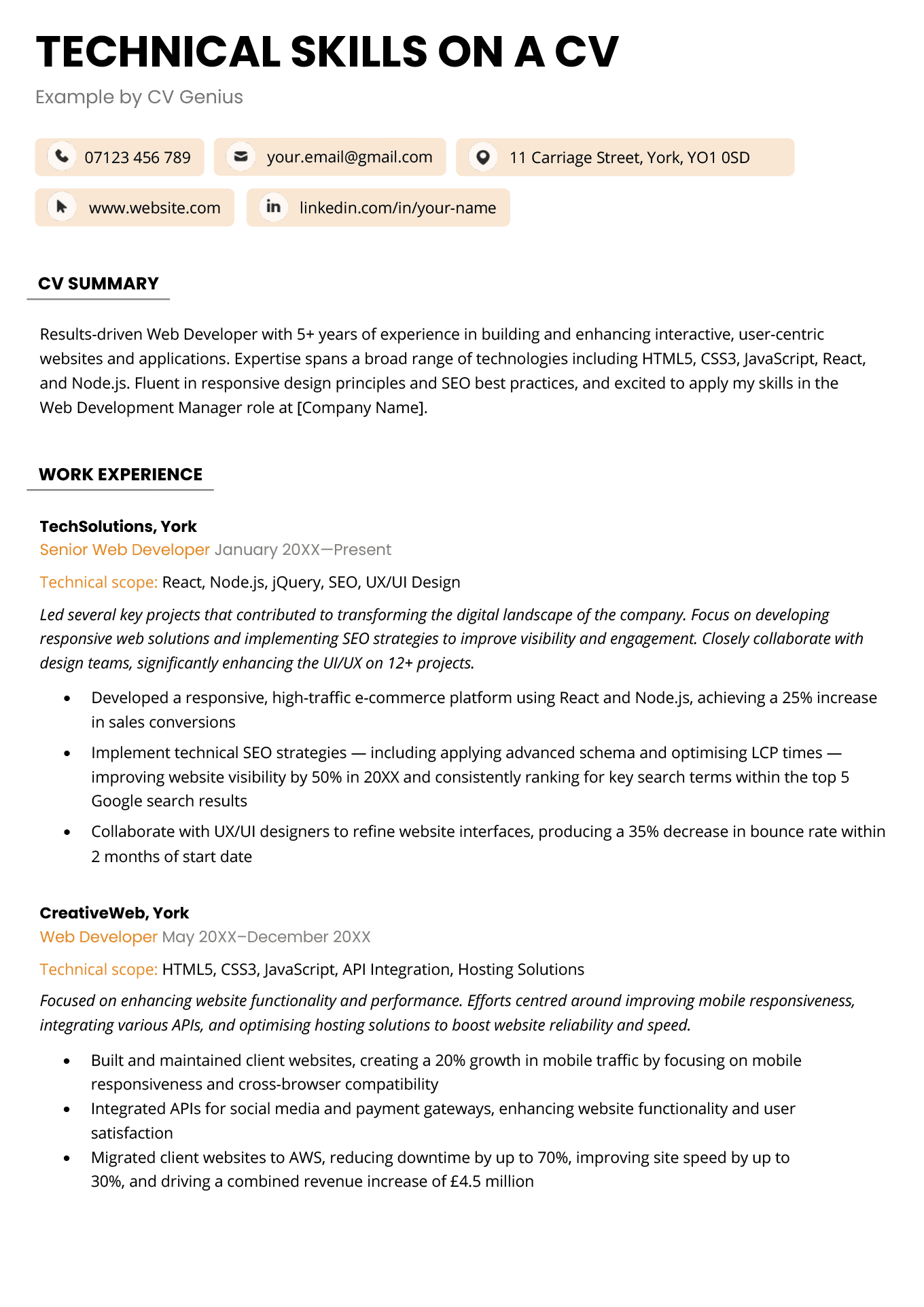
Technical Skills CV Example (Text Version)
YOUR NAME
Job Title
07123 456 789 | your.email@gmail.com | 11 Carriage Street, York, YO1 0SD | www.website.com | linkedin.com/in/your-name
PERSONAL STATEMENT
Results-driven Web Developer with 5+ years of experience in building and enhancing interactive, user-centric websites and applications. Expertise spans a broad range of technologies including HTML5, CSS3, JavaScript, React, and Node.js. Fluent in responsive design principles and SEO best practices, and excited to apply my skills in the Web Development Manager role at [Company Name].
WORK EXPERIENCE
Senior Web Developer – TechSolutions, York
January 20XX – Present
Technical Scope: React, Node.js, jQuery, SEO, UX/UI Design
Led several key projects that contributed to transforming the digital landscape of the company. Focus on developing responsive web solutions and implementing SEO strategies to improve visibility and engagement. Closely collaborate with design teams, significantly enhancing the UI/UX on 12+ projects.
- Developed a responsive, high-traffic e-commerce platform using React and Node.js, achieving a 25% increase in sales conversions
- Implement technical SEO strategies — including applying advanced schema and optimising LCP times — improving website visibility by 50% in 20XX and consistently ranking for key search terms within the top 5 Google search results
- Collaborate with UX/UI designers to refine website interfaces, producing a 35% decrease in bounce rate within 2 months of start date
Web Developer – CreativeWeb, York
May 20XX – December 20XX
Technical Scope: HTML5, CSS3, JavaScript, API Integration, Hosting Solutions
Focused on enhancing website functionality and performance. Efforts centred around improving mobile responsiveness, integrating various APIs, and optimising hosting solutions to boost website reliability and speed.
- Built and maintained client websites, creating a 20% growth in mobile traffic by focusing on mobile responsiveness and cross-browser compatibility
- Integrated APIs for social media and payment gateways, enhancing website functionality and user satisfaction
- Migrated client websites to AWS, reducing downtime by up to 70%, improving site speed by up to 30%, and driving a combined revenue increase of £4.5 million
EDUCATION
MSc in Web Development, Middlesborough
Teesside University 20XX – 20XX, Merit
Relevant modules: Data Persistence and Resilient Networks, Agile Development Practices, Web Security
BSc in Computer Science, Manchester
University of Manchester 20XX – 20XX, Upper Second-Class Honours (2:1)
Relevant modules: Advanced Web Technologies, Database Systems, Software Engineering, Human–Computer Interaction (HCI)
Certifications
- Azure Developer Associate – Microsoft Certified, 20XX
- Full Stack Software Developer Professional Certificate – IBM, 20XX
KEY SKILLS
- HTML5, CSS3, JavaScript (ES6+), PHP
- React, Node.js, Express, Bootstrap, jQuery
- Git, webpack, npm, Visual Studio, Adobe Creative Suite
- Responsive web design
- SEO, UX/UI
- Agile and Scrum methodologies
HOBBIES & INTERESTS
- Avid rock climber
- Photography
- Playing football
- Reading sci-fi and fantasy novels
Frequently asked questions about technical skills
Below are answers to four questions you might have about technical skills:
- How do you improve your technical skills?
- How do you describe your technical skills in an interview?
- What is the most important technical skill?
- What should I be mentioning on my cover letter to get an entry level help desk role with no IT experience?
1. How do you improve your technical skills?
You can improve your technical skills by:
- going to school, university, or college
- taking online courses
- keeping up-to-date with the latest trends in your industry
- attending relevant conferences and exhibitions
- finding a mentor
- teaching others
- participating in related competitions (e.g., hackathons)
2. How do you describe your technical skills in an interview?
To describe your technical skills in an interview, provide detailed examples of times you’ve used them to achieve positive results and solve problems. For instance:
‘When I was working at a financial firm, we started experiencing issues with our reporting system. The reports were taking a long time to run and were often filled with errors that had to be manually resolved, causing delays for our clients.
I analysed the code for the reporting system and found a number of inefficiencies and outdated functions. I then worked with the team to update the code, including optimising queries and introducing new libraries that could handle large datasets more efficiently.
After implementing these changes, we significantly improved the system’s speed and reliability, saving time for our clients and increasing our overall efficiency as a company.’
3. What is the most important technical skill?
There isn’t a single most important technical skill, as the importance of different technical abilities varies depending on your role. But some technical skills generally considered important across many fields include:
- computer skills
- programming
- data analysis
- operating systems
- cloud computing
- research skills
4. What should I be mentioning on my cover letter to get an entry level help desk role with no IT experience?
This question was posed on Reddit by throwaway1932-23:
If you’re applying for an IT role without any IT experience, your cover letter (and CV) should focus on your relevant training. Some information you should be mentioning includes:
- school, university, or self-study IT courses you’ve completed
- IT certifications you’ve received
- examples of how you’ve developed IT expertise in your personal life
Also, emphasise your ability to quickly learn technical concepts, giving specific examples to back up your claims. Here’s some great content from a cover letter for an IT role written by an applicant without any IT experience:
Recently, I completed a comprehensive course in Network Security offered by Coursera, through which I gained a deep understanding of network infrastructure, cybersecurity best practices, and the latest in encryption technologies. Additionally, I have always been the go-to tech support for family and friends, successfully setting up home networks, conducting regular maintenance on personal computers, and troubleshooting a variety of software issues.
